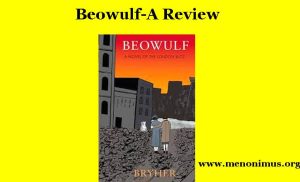Beowulf-A Review
Beowulf-A Review
“Beowulf,” the timeless epic poem, stands as a monumental piece of Anglo-Saxon literature, weaving together the themes of heroism, loyalty, and the inexorable passage of time. Penned by an anonymous poet, the epic’s enduring appeal lies not only in its action-packed narrative but also in its exploration of human virtues and frailties.
Structure and Plot
The epic unfolds across three interconnected sections, each portraying a distinct phase of the titular hero’s life. The tale commences with Beowulf’s arrival in the Danish kingdom of Heorot, where he offers his services to King Hrothgar to rid the land of the fearsome monster, Grendel. Beowulf’s triumph over Grendel establishes him as a true hero, a symbol of strength and courage.
The second part introduces Grendel’s vengeful mother, prompting Beowulf to venture into her lair to ensure the safety of the kingdom. This segment delves into the complexities of heroism, exploring the motivations that drive a hero and the consequences of his actions.
The narrative concludes with Beowulf’s own reign as king and his final battle against a dragon, reflecting the inevitability of mortality and the legacy left behind. The poem’s tripartite structure serves as a metaphor for the cycle of life: birth, life’s trials, and eventual death.
Themes and Symbolism
“Beowulf” delves into numerous themes that resonate across cultures and eras. Heroism is central, portraying Beowulf’s valor as he battles monstrous adversaries. Loyalty and camaraderie are equally emphasized, with the bonds formed between warriors serving as a testament to the power of unity.
The poem’s setting in a pagan world juxtaposes with its Christian elements, offering a layered perspective on faith and fate. Symbolically, Grendel represents mankind’s primal fears, Grendel’s mother embodies the unknown, and the dragon symbolizes the consequences of unchecked greed and ambition.
Characterization:
The characters within “Beowulf” are archetypal, embodying virtues and flaws that make them relatable and relevant even today. Beowulf himself is the embodiment of bravery, honor, and determination, yet his later years reveal the inevitability of vulnerability and decline.
Hrothgar, as both a wise king and a mentor figure, adds depth to the narrative, while Grendel and his mother evoke sympathy despite their monstrous nature. The supporting cast of warriors adds layers to the story, reflecting the diversity of human experience and reaction.
Language and Style:
The poem’s language showcases its roots in oral tradition, with alliteration and rhythmic patterns contributing to its captivating storytelling. The use of kennings (figurative, compound expressions) adds an element of creativity and mystique to the language.
Legacy and Influence:
“Beowulf” remains an influential work that has left an indelible mark on literature. It has inspired countless adaptations, from novels to movies, testifying to its universality and enduring relevance. Scholars and enthusiasts continue to study the poem, exploring its historical context and themes, which reveal insights into the culture and values of the Anglo-Saxon society.
Conclusion:
“Beowulf” is a literary masterpiece that transcends time and cultural boundaries. Its exploration of heroism, loyalty, and the complexities of human nature resonates with readers across generations. Through its engaging narrative, symbolic depth, and rich language, “Beowulf” offers a glimpse into the eternal struggle between darkness and light, leaving a lasting legacy in the realm of epic literature. 0 0 0.
You May Like: The Satanic Verses by Salman Rushdie-A Review
N. B. The article originally belongs to the book ‘The Reviews of Epic Literature Around the World Vol-I‘ by Menonim Menonimus.








